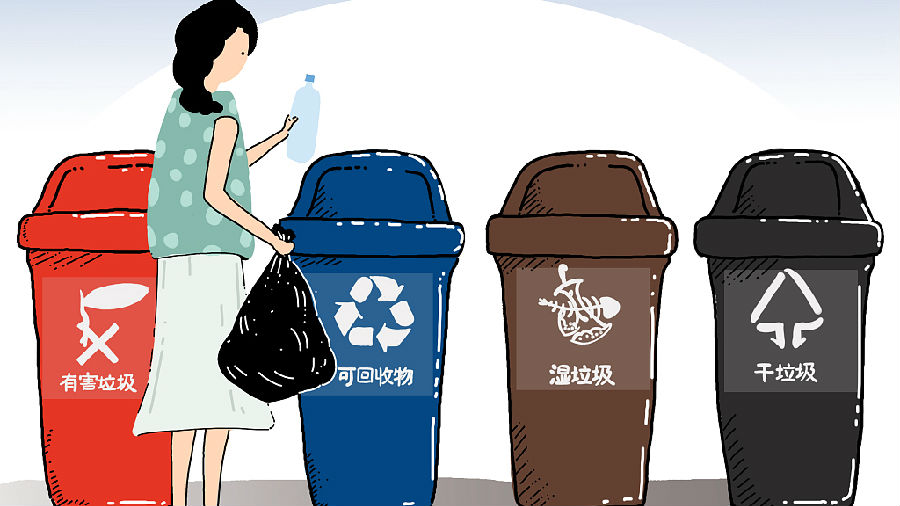City gets serious about waste
上海垃圾分類時代已至,其他城市還遠嗎?
If you live in Shanghai, you might have to take a "lesson" in sorting garbage, as the city recently introduced new garbage-sorting regulations.
如果你生活在上海,你或許得上“一堂垃圾分類課”,因為該市近期出臺了全新的垃圾分類條例。
It's now required that people should sort garbage into four categories, namely recyclable, harmful, dry and wet waste. However, if people fail to sort their garbage properly, they can be fined up to 200 yuan.
如今,人們需要將垃圾分成“可回收物、有害垃圾、干垃圾、濕垃圾”四大類。混合投放垃圾最高可要處以200元罰款。
More cities are introducing similar regulations, following the practice in Shanghai. By the end of 2020, garbage-sorting systems will have been built in 46 major Chinese cities, including Beijing and Shenzhen, reported People's Daily.
繼上海之后,越來越多的城市都在推出類似的條例。據《人民日報》報道,2020年底前,包括北京、深圳在內的全國46個重點城市將基本建成垃圾分類處理系統。
According to a study by the Policy Research Center for Environment and Economy, under the Ministry of Ecology and Environment, over 90 percent of the public believe that garbage sorting is important for the protection of the environment.
國家生態環境部環境與經濟政策研究中心的一項研究顯示,超過90%的大眾認為垃圾分類對環境保護是重要的。
However, garbage sorting is still a big problem in China. Only 30 percent of participants said they think they are adequately sorting their trash, the study noted.
但垃圾分類在中國仍是一大問題。該研究指出,只有30%的受訪者認為自己充分地進行了垃圾分類。

According to Xinhua News Agency, it's partly because many people lack the willingness to sort their own waste. In the past, some previous garbage regulations didn't give clear fines for people who failed to sort garbage.
據新華社報道,這種情況某種程度上源于許多人缺乏垃圾分類的意愿。過去的一些垃圾分類條例也并未明確規定對混合投放垃圾者所處的罰款數額。
"It's a must to have a legal guarantee to promote garbage sorting," Liu Jianguo, a professor from Tsinghua University, told China Daily.
“必須要有一套法律保障來推動垃圾分類,”清華大學教授劉建國在接受《中國日報》采訪時表示。
Liu Xinyu, a researcher of the Shanghai Academy of Social Sciences, told China Daily that the importance of the new regulations in Shanghai is to change the past voluntary action into compulsory action for everyone.
上海社會科學院研究員劉新宇在接受《中國日報》采訪時表示,上海這項新條例的重要之處在于將過去的自愿行為變為每個人的必修課。
Aside from China, many other foreign countries have also introduced garbage-sorting regulations. In Japan, waste sorting has become a basic survival skill, reported Xinhua. There is a fixed time for disposal of each kind of garbage and littering can result in high fines and even jail time.
除了中國以外,許多其他國家也出臺了垃圾分類的相關規定。據新華社報道,在日本,垃圾分類已經成為一項必備的生活技能。每種垃圾都有固定的處理時間,而亂扔垃圾者會面臨高額罰款甚至監禁。
In Germany too, people are asked to sort waste into specific categories, reported HuffPost. For example, in Berlin, people have yellow bins for plastic and metals and blue bins for paper and cardboard.
據《赫芬頓郵報》報道,在德國,人們也會被要求將垃圾分成特定的種類。比如,在柏林,人們會用黃色垃圾桶裝塑料和金屬,藍色垃圾桶裝紙制品。













